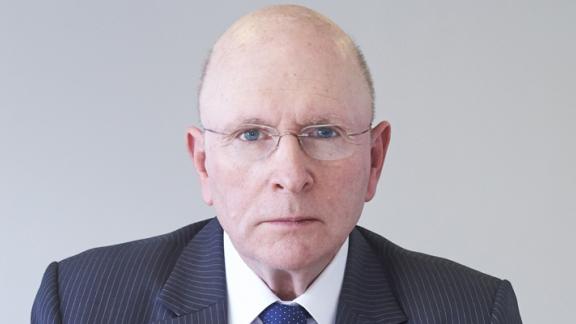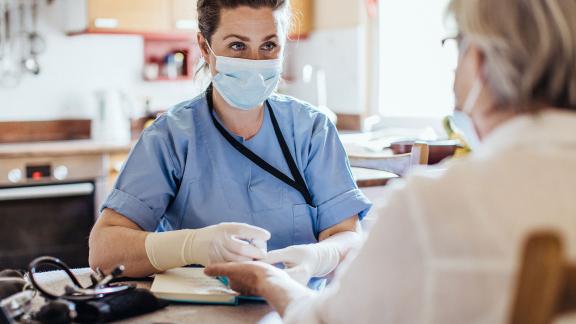All changed, changed utterly

This phrase, from WB Yeats’s Easter, 1916, has been used about the NHS before, but never has it been so apt. When the epidemic lapped at our shores and many predicted a struggling NHS would instantly be overwhelmed, we said the NHS would flex. It has. So writes Niall Dickson chief executive of the NHS Confederation.
The extent to which it has adapted has been breath-taking. This is not just the building of massive field hospitals in London, and soon, in Birmingham and Manchester (surely only the Chinese could do that?) It is also about the creation of huge capacity, by freeing beds, building new wards, creating new triage systems and virtual outpatient clinics, as well as no less significant and more unseen innovation in the organisation of primary, community and mental health services.
Things will never be the same – across the NHS Confederation, we are gathering data and information from all over the service. It is not hype or sentimentality to celebrate the extraordinary effort that is being made, including many personal sacrifices at all levels and in all parts of the service. But the challenges are real. Some have been well-rehearsed, but we need to keep feeding back to the centre and sharing experience as everyone adapts to a position that changes radically by the day.
Scale
It has always been the standard journalist’s question – will the NHS cope? The short answer is we do not know – no one knows. But the modelling on which we are relying is becoming more reliable as hard data feeds in. You should soon be receiving more reliable regional and local level predictions.
As you are probably aware, there are three key factors. First, the doubling rate – how quickly does the number of cases multiply? Currently across the UK, it is about 3.3 days, slower than the worst-case scenario, but scary. Secondly, the admission and discharge rates – how well can the whole system avoid admissions and release beds? Again, herculean efforts are being made in both the acute and community sectors to make this happen. Nowhere should there be arguments about price – the model agreed with the independent sector should be followed in social and community care.
Perhaps above all, spread will be affected by how compliant we all are when it comes to social distancing. NHS staff can help – as 1 in 50 of the population, they have the power to spread the word to slow the spread of the virus.
London looks like it will be the first test and is bracing itself for a big surge. Already there has been a major expansion of ICU-style beds, and the service will have both the new Nightingale Hospital and independent sector capacity coming on stream. But other regions will soon follow, and the next three to four weeks will be crucial. My impression is that there is at least some hope at national level that we may manage to avoid the worst case, where the NHS will not cope. But of course, that remains a risk.
Staff, staff, staff
How we cope will also largely depend on how we recruit, support and deploy staff. The call to 65,000 recently retired professional staff has produced about 21,000 who have said they are willing to return. About one third of them will not or cannot directly treat patients and will be diverted to the 111 service. The others will go to regional hubs, who in turn will process them and send them to individual employers. We can expect more calls to bring in more former staff soon.
At the same time, there is useful work going on to relax rules around roles and responsibilities – professional regulators, Royal Colleges, specialty societies, defence organisations and others have been collaborating to help create a much more flexible workforce. Expect new guidance and support on Monday for employers to help your staff to take on unfamiliar roles.
There may have been good reasons for concentrating testing on hospitalised patients and deaths, but the roll out of tests to staff who need them cannot come quickly enough. Absenteeism appears to be a problem everywhere through illness and self-isolation, and the antigen test, as well as the antibody test (for which NHS and care staff must also be the priority), should reduce staff who are away unnecessarily.
Despite all this, staffing looks set to become more significant – already, furious efforts are being made to recruit staff for the Nightingale. We will need to be careful we do not cannibalise one service for the sake of another.
PPE
We have been inundated with concerns about PPE – doctors having to buy their own visors, community nurses and social care staff saying they have nothing, GPs and many others sounding extremely anxious.
The truth is the PPE supply chain could not cope with the huge increase in demand. Please do let us know if you have ongoing difficulties, as we are told the problems are being or have been fixed, and supplies should now be getting through.
With military support, the NHS at the centre has moved mountains to construct what is in effect two new supply chains, one of which will manage more than 30,000 new customers in primary and social care, for whom the previous system was simply not designed. It should make ordering as easy as going on Amazon. We shall see.
But there have been two other issues – first, the nature of the supplies. These are from emergency stockpiles (one set up in anticipation of an influenza pandemic, the other for a no-deal Brexit). It means some equipment is not familiar and may have old date stamps (although everything is centrally checked before it goes out). There has also been a shortage of fit tests kits for masks, which, again, now seems to have been resolved.
More serious has been the confusion over the guidance. Staff must have clarity over what equipment is needed, in which location, and for each procedure. We urgently need consensus from the expert bodies. There are now moves to achieve this, but not before time. We cannot ask staff to put themselves into risky clinical situations, unless we can give them the right level of protection and be able to demonstrate to them that this is the case.
There has been a lot of talk about how we diverge from WHO guidelines, and how we are opting for lesser protection and much else. Much of this is misinformed, but the damage caused by the lack of clear guidance cannot be understated.
Trust
As a result, we desperately need to restore trust. The UK government and national NHS bodies have an underlying problem of trust with some clinical staff, even if it is not with everyone and it is not all the time. You will have data and a view about how clinicians view your own organisation, and mostly trust in local leaders is much stronger.
But it is an issue – many doctors in training, bruised by the industrial action four years ago, distrust authority of any kind. Even the CMO and Public Health England are seen by some as being mouthpieces for a callous government. In our view, this is wrong – it is, for example, ironic that the some of the principal guidance on PPE has been led by Health Protection Scotland (backed by all four public health bodies in the UK) and it actually has nothing to do with UK politicians.
But even if it is misplaced, the suspicion and anxiety this creates is real and the challenge must be to do everything possible to counteract it. Perhaps we also need to give platforms to different voices – authority is not an exclusive attribute of age and it would be good to promote younger and more diverse clinical leaders. Maybe this should be the moment to engage and empower doctors in training, ward and community leaders, and indeed, all those who are overseeing frontline care.
Support
I do hope you are managing – leadership at any time can be lonely, and often more so in a crisis. We are keen to hear from you without distracting you and we will continue to provide information and support where we can and to engage with government and central bodies.
I have listed below some of our recent activity and publications, which you may find helpful.
NHS Confederation (including NHS Employers) information and activity
- Sign up for the NHS Confederation COVID-19 Daily Member Briefing
- NHS Confederation member information on Covid
- Raising the need for clear PPE guidance
- Seeking death in service cover for returning staff
- Raising issues around visas
- Registration and language testing for incoming staff from overseas
- Where your staff can get priority and discounts during the emergency
- Where your staff can get access to well-being resource apps at no cost
Niall Dickson is chief executive of the NHS Confederation. Follow him on Twitter at @NHSC_Niall.



